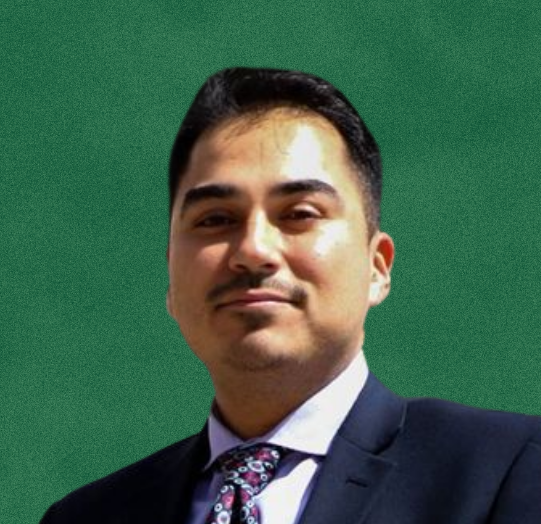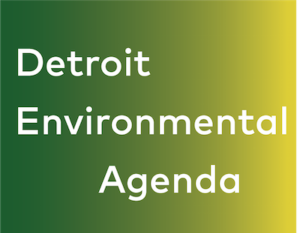David Sanchez

Q: Where can people go to learn more about your biography? If not readily available online, please describe in 150 words or less, your relevant experience, public offices held (if any), involvement in environmental causes, and membership in any environmental organizations. If you currently hold office, describe any votes or actions demonstrating concern for the environment.
A: https://www.davidfordetroit.com/bio
Community
Q: If elected, how will you work with Detroit residents to ensure that they benefit from and partake in the decision-making surrounding local development projects and that potential adverse impacts of those projects are identified, measured, monitored and mitigated? Moreover, how would you work to put more power into the hands of residents to maintain and revitalize their own communities and to access vacant land through the DLBA?
A: The community benefits ordinance mandates that a Neighborhood Advisory Council is created that oversees the process of a community benefits agreement. I feel like this is a great way to mitigate adverse impacts of developments and to make sure the impacted community benefits from a development. The best thing a city council member can do is help to effectively organize the neighborhoods in their district so that they can advocate for themselves through the CBO process and to demand vacant land through the DLBA.
Q: If elected, what budget appropriations would you propose to increase investment in needed social and environmental services to help improve the quality of life and health of Detroit residents?
A: In environmentally impacted areas there are some households that are given funding for new windows and air filtration systems. I will expand this program to cover a wider area. For example the Gordie Howe Bridge is a billion dollar project that will greatly increase the amount of truck traffic in Southwest Detroit. It is not right that only a tiny geographic area is offered upgrades to their residences when all of Southwest Detroit is and will be greatly impacted by the increased truck traffic.
Public Health
Q: What long term solutions do you see for addressing vehicle speeds and making our streets safer?
A: The speed humps were a great idea and I am in support of expanding this throughout the city and district. It is also important to educate people on the dangers of speeding. The District 6 council members should use their platform to ask residents to drive more safely and should console residents that have lost family members and loved ones in fatal car accidents.
Q: How will you work to reduce the negative health impacts of air quality on the residents of Detroit?
A: Corporate polluters and trucks should use the best available technology to decrease the pollution they are creating in the district. I will work to get funding for this, and in some cases mandate that companies invest in green technology that limits pollution.
Q: If elected, what actions will you take to work toward safer, healthier, and more affordable housing for all Detroiters?
A: I will work with the Detroit Land Bank to streamline the home ownership process for Detroiters. Historically the Detroiters have been redlined and pushed out of home ownership. The city has a perfect opportunity to get rid of all the red tape and allow residents to buy homes by bypassing the conventional mortgage process and selling directly to the residents through land contracts. Also, the home 0% home repair program is not very effective as good credit is needed to get approved. Exceptions have to be made for Detroiters that have been here who otherwise cannot afford badly needed home repairs.
Energy
Q: What are your priorities to reduce emissions and lessen the impacts of climate change in Detroit during your term in office?
A: The technology exists for residents and neighborhoods to get off of the grid. We can, on a city level, make major investments into green infrastructure to reduce or eliminate the costs of energy bills. I will advocate for the public funding of solar energy for neighborhoods and households starting with those in poverty that are in urgent need of protection from utility shut offs. This has the added benefit of reducing emissions.
Q: What are your plans for helping the city transition to renewable energy and how will you ensure that the cost benefits and increased resilience that come from the use of renewables is made accessible to low-income and vulnerable communities across Detroit?
A: Great minds think alike. On a city level we need major investments in solar power and renewable energy. We need to get this new green infrastructure to residents in poverty since they need it the most.
Recycling
Q: How can the city increase recycling, composting, and the use of post-consumer recycled materials, while addressing the city’s litter and illegal dumping problem?
A: Education and awareness to increase involvement in the recycling program is the best way. We need to make residents aware of the recycling program, let them know the personal benefits to recycling, and keep the recycling bins at zero cost to the resident. We need to enforce and investigate all illegal dumping activities. If an illegal dumping task force has to be created to keep our city safe from debris and litter then I will advocate for such.
Jobs
Q: What steps would you take to prepare the local workforce to take advantage of and be part of the movement toward a green economy, through qualifying for good paying infrastructure and clean energy jobs, amongst others?
A: It is my top priority to help create good jobs for Detroiters that pay a living wage and more. I will expand and create free education and training programs that get residents ready for the new green infrastructure jobs that are currently in demand.
Water
Q: How will you ensure that clean water is accessible and affordable to all Detroiters?
A: I will continue to advocate for the federal infrastructure bill that I worked on while at Congresswoman Brenda Lawrence’s Office. The City of Detroit was built for two million people, now we have about 700,000 people that are left with the cost of maintaining our water infrastructure. The federal government needs to step in and help with the cost of repairing and maintaining our water infrastructure. I will also advocate for an ordinance that ends water shut offs. We cannot deprive people of water simply because they are in poverty and cannot afford the bill. Shutting off water is not a solution to poverty.
Q: How will you help municipal agencies and property owners integrate Green Stormwater Infrastructure (GSI) across the city to manage stormwater and reduce drainage charge fees for property owners?
A: Instead of imposing high drainage fees, the city should have worked with businesses and residents on upgrading to permeable surfaces and parking lots where needed. I will seek out grants and work projects like these into the budget for those in the district that need it.
Optional
Q: Please identify the top environmental concerns to you personally, identify the environmental issue in your community that is the most pressing, and what you would like to do as an elected official to address this most pressing concern.
A: The pollution from the various corporate polluters in District 6 is of great concern. Also, our water is not safe because of the riverfront and sea wall erosion. These along with mass house demolitions that have put lead and asbestos in our neighborhoods is a pressing issue to the community. If elected I will work with my colleagues on city council to pass ordinances that protect the people, and work with the Mayor so that it can be signed into law.

